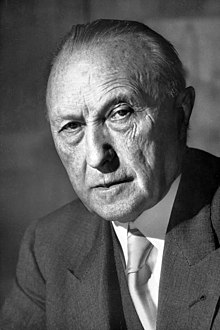
Back Konrad Adenauer Afrikaans Konrad Adenauer ALS Konrad Adenauer AN Konrad Adenauer ANG كونراد أديناور Arabic كونراد اديناور ARZ Konrad Adenauer AST Konrad Adenauer Aymara Konrad Adenauer Azerbaijani Konrad Adenauer BAR
Konrad Adenauer | |
|---|---|
 Adenauer in 1952 | |
| Chancellor of West Germany[a] | |
| In office 15 September 1949 – 16 October 1963[1] | |
| President | |
| Vice-Chancellor | |
| Succeeded by | Ludwig Erhard |
| Minister for Foreign Affairs | |
| In office 15 March 1951 – 6 June 1955 | |
| Chancellor | Himself |
| Preceded by | Office established |
| Succeeded by | Heinrich von Brentano |
| Leader of the Christian Democratic Union | |
| In office 1 March 1946 – 23 March 1966 | |
| Bundestag Leader | |
| Preceded by | Office established |
| Succeeded by | Ludwig Erhard |
| President of the Parliamentary Council | |
| In office 1 September 1948 – 23 May 1949 | |
| Preceded by | Office established |
| Succeeded by | Office abolished |
| Lord Mayor of Cologne | |
| In office 13 October 1917 – 13 March 1933 | |
| Preceded by | Max Wallraf |
| Succeeded by | Günter Riesen |
| In office 4 May 1945 – 6 October 1945 | |
| Preceded by | Willi Suth |
| Succeeded by | Willi Suth |
| President of the Prussian State Council | |
| In office 7 May 1921 – 26 April 1933 | |
| Preceded by | Office established in 1921 |
| Succeeded by | Robert Ley |
| Member of the Bundestag for Bonn | |
| In office 7 September 1949 – 19 April 1967 | |
| Preceded by | Constituency established |
| Succeeded by | Alo Hauser |
| Personal details | |
| Born | Konrad Hermann Joseph Adenauer 5 January 1876 Cologne, Kingdom of Prussia, German Empire |
| Died | 19 April 1967 (aged 91) Rhöndorf, West Germany |
| Resting place | Waldfriedhof, Rhöndorf, Bad Honnef |
| Political party |
|
| Spouses |
|
| Children | 8 |
| Alma mater | |
| Signature | |
Konrad Hermann Joseph Adenauer (German: [ˈkɔnʁaːt ˈʔaːdənaʊɐ] ⓘ; 5 January 1876 – 19 April 1967) was a German statesman who served as the first chancellor of the Federal Republic of Germany from 1949 to 1963. From 1946 to 1966, he was the first leader of the Christian Democratic Union (CDU), a new founded Christian-democratic party, which became the dominant force in the country under his leadership.
As a devout Roman Catholic, Adenauer was a leading politician of the Catholic Centre Party in the Weimar Republic, serving as Mayor of Cologne (1917–1933) and as president of the Prussian State Council. In the early years of the Federal Republic, he switched focus from denazification to recovery, and led his country to close relations with France, the United Kingdom, and the United States.[2] During his years in power, he worked to restore the West German economy from the destruction of World War II to a central position in Europe with a market-based liberal democracy, stability, international respect and economic prosperity.[3]
Adenauer belied his age by his intense work habits and his uncanny political instinct. As a strong anti-communist, Adenauer was deeply committed to an Atlanticist foreign policy and restoring the position of West Germany on the world stage. Adenauer was a driving force in re-establishing national military forces (the Bundeswehr) and intelligence services (the Bundesnachrichtendienst) in West Germany in 1955 and 1956. Adenauer refused the diplomatic recognition of the rival German Democratic Republic as an East-German state and the Oder–Neisse line as a post-war frontier to Poland. Under Adenauer, West Germany joined NATO. As a proponent of European unity, he signed the Treaty of Rome in 1957. Adenauer is claimed as one of the "Founding fathers of the European Union".
Cite error: There are <ref group=lower-alpha> tags or {{efn}} templates on this page, but the references will not show without a {{reflist|group=lower-alpha}} template or {{notelist}} template (see the help page).
- ^ Cite error: The named reference
KAS_111063was invoked but never defined (see the help page). - ^ "Konrad Adenauer (1876–1967)".
- ^ Richard Hiscocks, The Adenauer era (1975) p. 290
© MMXXIII Rich X Search. We shall prevail. All rights reserved. Rich X Search